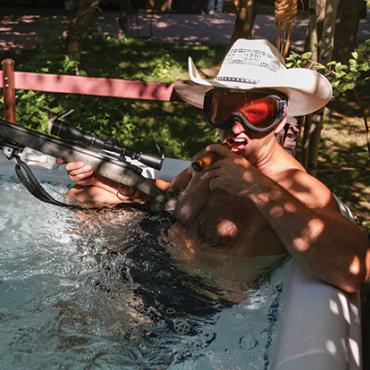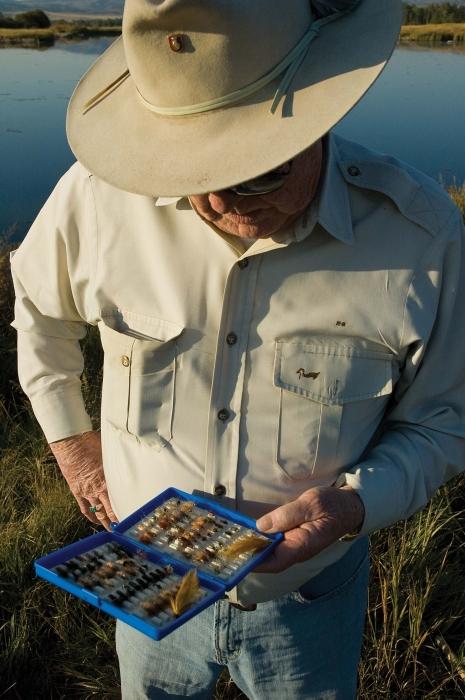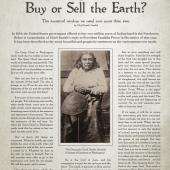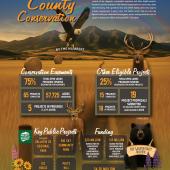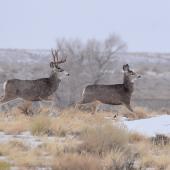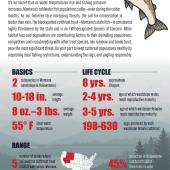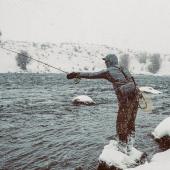Bud Lilly, Father of Fly Fishing
Every sport has its legends – great ones who, with courage and grace, have done things just a little bit better than everyone else. Baseball has Babe Ruth; boxing, Mohammed Ali; tennis, Billy Jean King. These heroes exemplify the indomitable human spirit, showing us what it means to strive valiantly, to rise above the rest, and to know, in the end, the victory of high accomplishment.
In Montana, where there’s little in the way of professional sports, our legends tend to be a little different. They are often those involved in sports and activities that embody our western ideals: fortitude, self-sufficiency, inner resolve, and an appreciation of, and respect for, the natural world. They are explorers, adventurers, cowboys, conservationists, and outdoorsmen. One of these legends is Montana’s famous fisherman, Bud Lilly.
There’s scarcely a Montana fly-fisherman alive who hasn’t heard of Bud Lilly. He’s a fly-fishing icon, having already acquired a permanent seat in the annals of angling. He is recognized as the leading authority on the fabled Madison river, and the nationally-renowned trout shop in West Yellowstone bearing his name is virtually a required stop on the itinerary of any visiting angler.
Bud knows how to catch trout. A professional guide for over 35 years, he reads the water and fish like no other. Books, articles, and even a video pay tribute to his abilities, and his streamside council has been sought by the likes of Charles Kuralt, Dan Rather, and Jimmy Carter. Local outfitters refer to him as "The Dean of Fly-Fishing."
Bud’s life began in 1925 in the tiny town of Manhattan, Montana. He started fishing almost as soon as he could hold a rod, and by the time he was ten he was regularly catching dinner for all his neighbors. It was in those early years that Bud began to develop a permanent attachment to fishing. As he matured and learned more about the sport, his passion for it grew. It would soon become his livelihood, and his life’s purpose.
But first Bud went to college, earned a degree in Applied Science, and got a job at a local high school. "I was very innocent – I thought that I could make enough money as a teacher to live on," he explains with a chuckle. West Yellowstone was becoming a busy place, so Bud began working there in the summertime. After a brief stint washing cars, he heard of a tackle shop for sale. His fisherman’s blood was stirred – perhaps he felt his calling – and he bought the shop. The year was 1952; Bud Lilly’s Trout Shop was born.
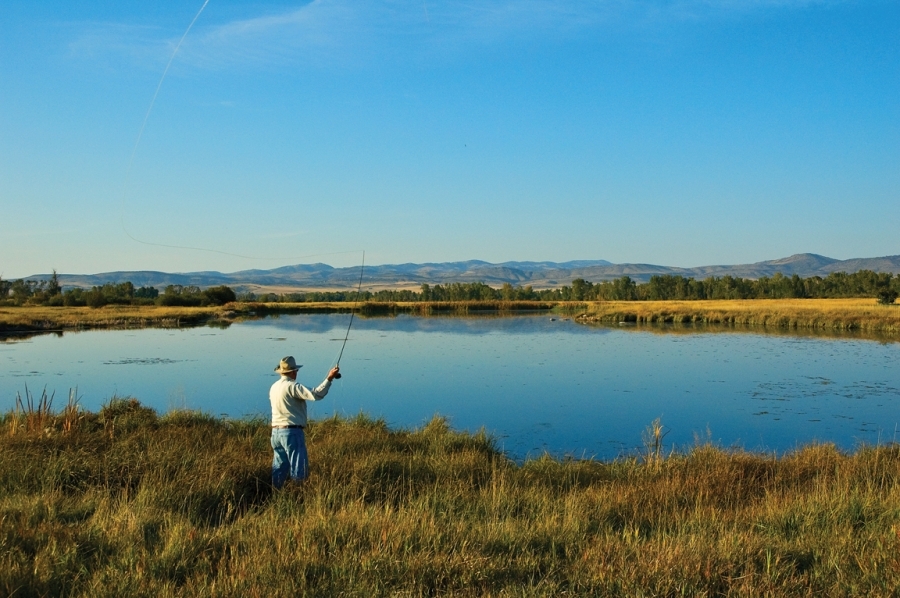
Bud pioneered the then-fledgling sport of fly-fishing, sending out catalogs, publishing promotional literature, and holding seminars with some of the biggest names in fishing. He gave angling instruction at the first fly-fishing school west of the Mississippi. A.J. McClane, Ted Trueblood, Ray Bergman, and other well-known outdoor writers began to flock to West Yellowstone in search of thick-bodied Montana trout. And they all stopped in to see the resident expert and fishing guide par excellence, Bud Lilly.
Always concerned about his fellow fly-fishers, Bud spearheaded the movement to make the typically male sport of fly-fishing more accessible and appealing to women. As early as the 60’s, Bud offered women-only fishing trips. He helped establish women’s fly-fishing clubs, and with his encouragement, his daughter became the first female fishing guide in Montana.
This kind of open-minded, egalitarian philosophy is Bud’s trademark. Fishing should be fun, he believes, and there’s no room for the elitist snobbery that runs rampant in modern fly-fishing. "Serious" fly-fishermen condemn the use of worms and metal lures as "crude" and "too easy," but Bud thinks differently: "A good bait-fishermen or lure-fishermen is just as talented as a fly-fishermen," he says, with due appreciation for what is merely "a different method." He reminds people of the importance of streamside courtesy. People must respect each other’s space; resentment and anger are equally out of place on the river. "You have to learn to share," he says.
Nowhere is Bud’s commitment to fly-fishing better shown than in his environmental ethic. He’s been called "Trout’s Best Friend" (in a book about his life by environmental historian Paul Schullery), because like Lee Wulff before him, Bud always seems to look at things from the fish’s point of view. As a result, his conservation philosophy is unyielding: he is committed to protecting and preserving the rivers and streams that make the West one of the greatest trout fisheries in the world. Catch-and-release fishing is imperative to this end. "I haven’t kept a fish for probably thirty years," Bud says, at once reflecting his personal philosophy and a sensible preservation strategy. He’s been promoting responsible environmental practices since 1950, long before it became fashionable to do so. He likes to joke about the time his wife accused him of spending more money preserving the environment than buying clothes for the kids.
But conservation is no laughing matter to Bud Lilly. "I’ve been involved with a lot of causes," he says. That’s putting it lightly. As a past national director of The Greater Yellowstone Coalition, a director of The Whirling Disease Foundation, a director-at-large for American Wildlands, and a board member of The Montana Land Reliance, Bud has fought tirelessly to protect trout and restore damaged waterways. He is also associated with The National Federation of Fly-Fishers and The Governor’s Task Force for Whirling Disease, and has worked with Trout Unlimited since its inception. Bud works to prevent development by establishing conservation easements on riverbanks, and is a major force in the movement to stop over-grazing and irresponsible logging around major rivers and their headwater streams. He recently petitioned the Fish and Wildlife Service to list the Westslope Cutthroat trout as a threatened species. "According to the law, they’re supposed to do so, but they’ve just put it on the back burner," Bud says, with a hint of impatience. As is his custom, he refuses to stand for this bureaucratic nonsense; he’s brought on a lawsuit to get things moving.
This is what makes Bud Lilly a legend – not just his fishing ability, but his determined conservation efforts. Thanks to him, the quality of many of Montana’s trout streams has been improved, and they’re now properly managed to insure that they’ll stay that way.
At 72 years old, Bud shows no signs of slowing down. "I’ve still got plenty of vigor," he says with a grin, and it shows – he has the lively gait of a man half his age, and he still fishes three or four days a week. When he’s not on the river, Bud visits local schools to teach kids about fishing and conservation. He also spends time at his "current love," The Angler’s Retreat, a lodge in Three Forks that caters to fly fishing visitors. The building had been in his family since 1915, and after his mother’s death in 1994, Bud remodeled the cozy, 18-room western inn. In addition to helping guests plan itineraries and arrange for guide services, The Angler’s Retreat also promotes the centennial of Lewis and Clark, schooling visiting fishermen on the famous explorers’ travels and adventures throughout Montana.
Bud is optimistic about the future of his increasingly popular sport, provided fly-fishermen continue to practice sound ethics. "We have to educate people about what the real values are – it isn’t just about catching something, it’s about preserving our opportunity to catch something," he says. It’s this kind of long-sighted view that promises our grandchildren an experience that we tend to take for granted – standing in a crystal-clear mountain river, listening to the crickets and the birds, feeling the cool Montana wind, and catching a trout.
Photos courtesy Steve Hunts. This article originally appeared in The Tributary, a now-defunct alternative newspaper for southwest Montana.

